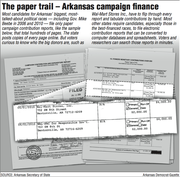Arkansas ranks as one of the most difficult states for the public to learn who's donating campaign money to candidates for state office -- especially in the biggest, most-talked-about races.
RELATED ARTICLES
http://www.arkansas…">States offer options for switch from paper to onlinehttp://www.arkansas…">What U.S. experts, state officials sayhttp://www.arkansas…">State grade low on finance reports
"If you can't get a good idea where a candidate's contributions are coming from, it's a concern," said Art English, acting chairman of Common Cause Arkansas, part of a national government watchdog group.
"Money is money. It translates into political power. ... It has a connection with what a candidate might do as an officeholder."
Curious voters in most states -- including neighboring Louisiana, Missouri, Oklahoma, Tennessee and Texas -- can go to state websites and search computerized data showing contributions for all major or statewide offices. The websites make it relatively easy to see who's bankrolling whom.
Arkansas, however, is among a dwindling handful of states that require only "the lowest quality of campaign finance disclosure practiced today," according to Peter Quist, an expert with the National Institute on Money in State Politics.
Like Mississippi, Arkansas posts pictures of typed or handwritten campaign report pages online, which cannot be searched or sorted by computer.
The state's 14-year-old system requires curious voters or researchers to spend hours, days, even weeks, leafing through pages and manually tabulating contributors and dollars, an Arkansas Democrat-Gazette review of Arkansas' campaign-finance disclosure practices found.
For many members of the public, that's impractical or impossible, experts say.
The state actually has in place a more modern, electronic system for campaign-finance reporting that would allow voters to spend far less time to get the same information. Installed in 2006, that system spits out campaign contributions into searchable computer spreadsheets, or databases, similar to what most other states offer.
But Arkansas law doesn't require candidates to use that electronic system.
Just 39 percent of all campaign finance filings have been entered into the optional electronic system this election year, according to Laura Labay, spokesman for Secretary of State Mark Martin's office.
The remaining 61 percent can be found only through eyeballing paper copies. The secretary of state's office is the repository for campaign-finance records.
Candidates who sidestep the newer system include those in the state's most-watched races, the newspaper found.
For example, Democrat Mike Ross and Republican Asa Hutchinson have filed only paper reports in their high-dollar governor's race. As of June 30, they had reported raising $6.3 million in total contributions for the general election race.
Ross and Hutchinson's campaigns had filed 58 paper contribution and spending reports containing more than 1,600 pages by the end of June. A researcher trying to answer the most basic questions, such as who are their biggest donors, would have to study each report.
Other statewide candidates who have filed only paper copies of their contribution reports include: Democrat John Burkhalter and Republican Tim Griffin for lieutenant governor, and Democrat Nate Steel and Republican Leslie Rutledge for attorney general.
Earlier this year, three winners of nonpartisan state Supreme Court seats, Justice Karen Baker and Court of Appeals Judges Rhonda Wood and Robin Wynne, chose to file only paper reports, according to campaign-finance records available through the secretary of state's office.
The difficulty in readily compiling campaign-finance information for those races, and most others, is a blow to Arkansas voters, experts say.
"With this kind of disclosure, the public and the press can't answer fundamental questions" concerning political campaign financing, said Quist, research director for the National Institute for Money in State Politics.
Among those questions, he said: "How much money did this candidate raise from contributors in other states? ... Who received money from this contributor?
"It's not even possible to determine something as basic as how much money is involved in a state's politics overall, if only paper reports exist," Quist said.
The nonprofit institute in Helena, Mont., compiles and studies campaign donations in all 50 states and shares the information, without charge, on its website: beta.followthemoney.org.
In collecting campaign contributions for Arkansas' statewide and legislative races, the institute pays contract workers to review and study paper copies of campaign reports and key the information into a searchable, sortable database. That means the nonprofit isn't always current on candidates' filings.
'A no-brainer'
Arkansas started posting candidates' paper contribution and spending reports online in 2000, when Sharon Priest was secretary of state.
During her first campaign for the office 20 years ago, "one of my issues was technology," she said.
"Our expression was: 'If we don't get involved with technology now, we will be roadkill on the information highway,'" said Priest, a former Little Rock mayor and now executive director of the Downtown Little Rock Partnership.
When she was sworn in as secretary of state in 1995, Priest remembers how little computer technology was in place. For example, the state's Uniform Commercial Code -- regulations for business and commercial transactions -- was "kept on recipe cards," she recalled.
During her eight years as secretary of state, Priest said, she wasn't able to upgrade campaign contribution filing as much as she had hoped, but expected that the state would move forward steadily.
"I imagined ... that you could key in the name of a person or corporation and see where they've given money," she said in an interview. "The point of technology is to make things easier for people."
Instead, Arkansas is still relying on essentially the same system that Priest introduced then. That needs to change, she said.
"We have moved into the 21st century," Priest said. "We have computers. We do have the information highway now. We're talking about providing more broadband to schools."
Filing campaign reports online so they are more accessible to the public "should be a no-brainer," Priest said.
Status quo
Key state officials interviewed by the Democrat-Gazette say there's no effort underway to require candidates to file in searchable computer formats.
"To my knowledge, the only push for mandatory online filing was made by the attorney general with respect to lobbyists" in 2009, said Arkansas Ethics Commission director Graham Sloan. His office oversees campaign finance reporting.
"The Ethics Commission has sought changes to the campaign-finance laws over the years, but such changes have not included making online filing mandatory for candidates," Sloan said.
Attorney General Dustin McDaniel, who backed 2009 legislation to require lobbyists to file electronically, declined to answer questions about whether he favors that requirement for candidates.
The secretary of state's office isn't pushing for required online filing either, said spokesman Labay.
"We aren't going to wade into the Legislature's territory on that one," she said.
The office also is looking into providing new voting equipment statewide that would cost $30 million, and that's the current priority, she said.
Among key elected leaders, Gov. Mike Beebe "favors having both options, at least for the time being," for candidates to file by computer or paper documents, said spokesman Matt DeCample.
Hutchinson campaign spokesman Christian Olson and Ross spokesman Brad Howard said their candidates' filings of paper campaign-finance documents are legal under state law. They have no plans now to start filing electronically.
Beebe, who is barred from seeking re-election because of term-limit laws, hasn't used the state's optional electronic filing system for any of his campaign contribution reports at least since seeking his first gubernatorial term in 2006, secretary of state records show.
DeCample said the current system that requires candidates to file paper copies of campaign-finance reports, then posts them online, does offer the public a chance to see information.
Its problems aren't "as much about transparency as accessibility," DeCample said. "Transparency is not whether you can access information readily. If something's not transparent, you can't have the information at all."
'Behind the curve'
The Arkansas General Assembly would have to pass a new law to require candidates to file searchable computerized campaign contribution reports, according to state election experts.
That puts legislators in a sticky position, those experts say. They would have to require themselves -- as well as other candidates -- to provide campaign-finance information in a format that's easier for voters and researchers to scrutinize.
Some lawmakers and state officials acknowledge that Arkansas lags in its campaign-finance reporting laws regarding computer filing.
"Arkansas is behind the curve" in requiring candidates to file contribution reports electronically, the Ethics Commission's Sloan said recently.
State Sen. Jon Woods said he's struggled to get information from Arkansas' paper campaign finance records.
"I've had those moments where I would like to see if a certain company gave to this candidate, and I don't have time to sit there and go through 10 [contribution and spending] reports," said the Springdale Republican, who has co-sponsored legislation to make other changes to campaign-finance laws.
"There needs to be an easier, more transparent way to do a search for contributors for any candidate," Woods said. "We need to come to a solution on what that answer might be. It shouldn't be as hard as it is now."
SundayMonday on 08/17/2014



